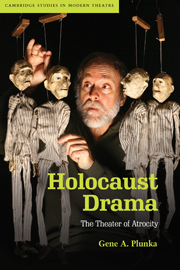Book contents
- Frontmatter
- Contents
- Acknowledgments
- 1 Introduction
- 2 Staging the Banality of Evil
- 3 Culture and the Holocaust
- 4 The Holocaust as Literature of the Body
- 5 Transcending the Holocaust
- 6 Marxism and the Holocaust
- 7 Aryan Responsibility During the Holocaust, I
- 8 Aryan Responsibility During the Holocaust, II
- 9 Heroism and Moral Responsibility in the Ghettoes
- 10 Dignity in the Concentration Camps
- 11 Holocaust Survivors in the United States and Israel
- 12 The Survivor Syndrome and the Effects of the Holocaust on Survivor Families
- 13 Holocaust Survivor Memory
- 14 The Holocaust and Collective Memory
- Notes
- Bibliography
- Index
12 - The Survivor Syndrome and the Effects of the Holocaust on Survivor Families
Published online by Cambridge University Press: 01 July 2009
- Frontmatter
- Contents
- Acknowledgments
- 1 Introduction
- 2 Staging the Banality of Evil
- 3 Culture and the Holocaust
- 4 The Holocaust as Literature of the Body
- 5 Transcending the Holocaust
- 6 Marxism and the Holocaust
- 7 Aryan Responsibility During the Holocaust, I
- 8 Aryan Responsibility During the Holocaust, II
- 9 Heroism and Moral Responsibility in the Ghettoes
- 10 Dignity in the Concentration Camps
- 11 Holocaust Survivors in the United States and Israel
- 12 The Survivor Syndrome and the Effects of the Holocaust on Survivor Families
- 13 Holocaust Survivor Memory
- 14 The Holocaust and Collective Memory
- Notes
- Bibliography
- Index
Summary
Holocaust survivors admit that luck was a major factor in whether they remained alive, while having a social support system in the extermination camps certainly also helped, for loners often perished. However, the most important concerted effort that enabled the victims to survive was the will to bear witness to the atrocities. Terrence Des Pres, himself a survivor of the lager, recalls, “For most survivors the chance to speak comes later. To bear witness is the goal of their struggle.” Despite the fact that SS guards relished telling prisoners that they had no chance of living and that even if someone miraculously survived to tell the tale, no one would believe that such persecution was possible, many prisoners struggled to survive to enact revenge as witnesses.
Immediately after their liberation from l'univers concentrationnaire, survivors were in no shape to bear witness. Former Ravensbrück inmate Simone Veil, interviewed by Annette Wieviorka, revealed, “For several days after my return I had such difficulty reading that I was afraid I would never again be able to take up normal intellectual activity.” Charlotte Delbo, who survived Auschwitz and Ravensbrück, stated that upon her return home after her internment, she tried to recall the gestures necessary to assume the shape of a living being: learning again how to talk, walk, answer questions, dream, imagine, laugh, and think for yourself. Gradually, she began to redevelop her senses of smell, taste, sight, and hearing, while later becoming accustomed to recognizing colors and sounds.
- Type
- Chapter
- Information
- Holocaust DramaThe Theater of Atrocity, pp. 275 - 299Publisher: Cambridge University PressPrint publication year: 2009



